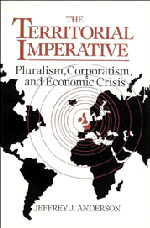Book contents
- Frontmatter
- Contents
- List of figures
- List of tables
- Preface
- 1 Introduction
- 2 Power-dependence and regional economic crisis
- 3 Central governments and regional policy
- 4 The British regions
- 5 The German Länder
- 6 The territorial imperative: Political logic interprets problem logic
- List of abbreviations
- Bibliography
- Index
4 - The British regions
Published online by Cambridge University Press: 26 March 2010
- Frontmatter
- Contents
- List of figures
- List of tables
- Preface
- 1 Introduction
- 2 Power-dependence and regional economic crisis
- 3 Central governments and regional policy
- 4 The British regions
- 5 The German Länder
- 6 The territorial imperative: Political logic interprets problem logic
- List of abbreviations
- Bibliography
- Index
Summary
As inhabitants of a centralized unitary state, local and regional actors in Britain appear to confront a stacked deck. One might expect this to result consistently in sporadic, uncoordinated, and ultimately ineffective responses, as subnational initiatives falter due to the dearth of resources at the regional level. In actual fact, actors in the North East and the West Midlands engaged in consistent and often effective attempts at regionwide coordination. These initiatives, subject to many of the centripetal strains described in the opening chapters, were nevertheless highly dependent on central government support. In both regions, the impact of government policy and the administrative process on patterns of interaction was not unmediated. Civil servants stationed in the government's regional outposts played a vigorous, independent role in shaping group objectives and relationships. Without minimizing the significant differences between these regional cases, it is possible to identify a modal subnational response in Britain – the attempt to escape the unwelcome consequences of competitive pluralism by creating more structured relationships among local, regional, and national actors. Government willing, corporate pluralism was the result.
The North East, 1928–86
The North East is situated along the eastern coast of England between Cleveland and Berwick-upon-Tweed. During the Industrial Revolution, the ready availability of coal reserves in the region attracted a range of industries, including iron and steel production, chemicals, shipbuilding, and heavy engineering, each of which depended on a cheap, steady supply of this fossil fuel.
- Type
- Chapter
- Information
- The Territorial ImperativePluralism, Corporatism and Economic Crisis, pp. 101 - 143Publisher: Cambridge University PressPrint publication year: 1992



